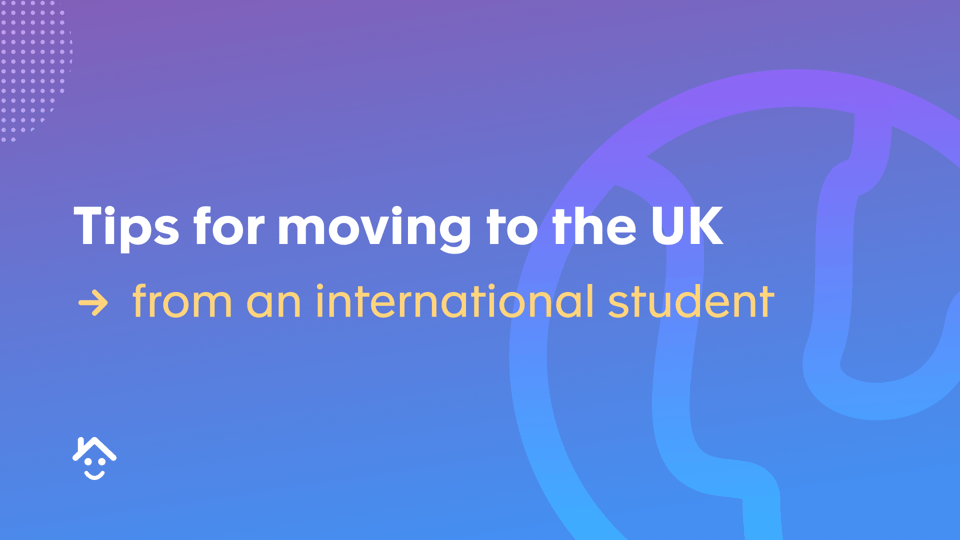Tips for moving to the UK from an International Student

Moving to a foreign country to study at university is exciting. You’ll have the opportunity to immerse yourself in a new culture, learn new things, and meet plenty of new people. However, moving is never easy. To help make the process less stressful, we’ve compiled a list of 6 things to consider when you are preparing your move to the UK.
Organise your student visa
As an international student coming to the UK, it is likely that you will need a student visa. The type of visa you need is dependent on the length of your study. If you are studying for less than six months, you will need a Standard Visitor Visa. Importantly, you are not allowed to work on this visa unless it is an optional placement as part of your university course. If you would like to work, you will need to apply for the Student Visa which will be discussed below.
You may also be eligible to apply for the Short-term Study Visa if your course is between 6-11 months long (no longer!) and you will be studying an English language course.
If your course lasts longer than 6 months you will need to apply for the Student Visa. Here is a short list of the documents required to apply for the student visa:
- Confirmation of Acceptance of Study (CAS): This is a 14-digit reference number you’ll receive from your university once you accept your offer. If you do not receive your CAS number within 2 weeks of accepting the offer, we recommend reaching out to your university.
- Proof of Finances: In order to study in the UK, you need to prove that you have the funds to pay your first year of tuition. In addition, you need to show proof that you are financially able to support yourself. This means that you need to have £1,023 (or £1,334 if you will be studying in London) per month for up to nine months. You must have this money in a bank for 28 consecutive days before applying. You might be exempt from providing financial evidence if your home country falls into the ‘differential evidence requirement.’ You can view the list
- English Language Skills: You might be required to take the Secure English Language Test (SELT) to show that you meet the minimum level of English language proficiency.
The student visa will cost you £363 and you will also have to pay a healthcare surcharge as part of the application. This amounts to £776 per year for students. If you are applying for 6 months or less, you do not need to pay a healthcare surcharge.
Sort your accommodation
It’s a good idea to have your accommodation booked and secure well before landing in the UK. There are a variety of accommodation options for international students including university accommodation, private accommodation, or shared houses.
If you would like to live in university accommodation, its best to contact your university. Some universities even have halls dedicated for international students if that is something you prefer. University halls are either self-catered (meaning you have access to a shared kitchen to cook your own meals) or catered (meaning your meals are provided at a canteen).
Another option is living in a shared house which many students tend to do after their first year of university. You can look at the options available in your city at Accommodation for Students.
Book travel
Now that you’ve sorted your accommodation and visa, it’s time to make your travel plans.
We heavily recommend waiting until you have received your student visa before booking any airline tickets. If your visa application happens to be delayed, needs more documentation, or even be denied, you don’t want to have to worry about cancelling or rescheduling flights and not receiving a refund.
Arrange pick-up at the airport
This is a step that is easily forgotten but very important. You will need to arrange a way to get from the airport to your accommodation. We recommend arranging it before arriving in the UK as you wouldn’t want to be left stranded.
First, you should contact your university as some will arrange a car to pick-up international students and take them to their accommodation. If not, you can book a taxi, Uber, or take public transportation.
Pack
You’ve got your visa, your airline ticket, and your accommodation. Now all that’s left to do is pack! But what do you need to bring?
This can depend greatly on where you are studying and how long you will be there. Here is a quick checklist of essentials that you should carry in your carry-on to get you started:
- Passport and Visa (plus photocopies!)
- University acceptance letter (You will likely need to show this to the immigration officer)
- Prescribed medications
- Essential toiletries
- Local currency or a bank card that works in the UK
- Power adaptor
Now that you’re ready, all that’s left to do is sit back and wait for the big day. Happy studying!



